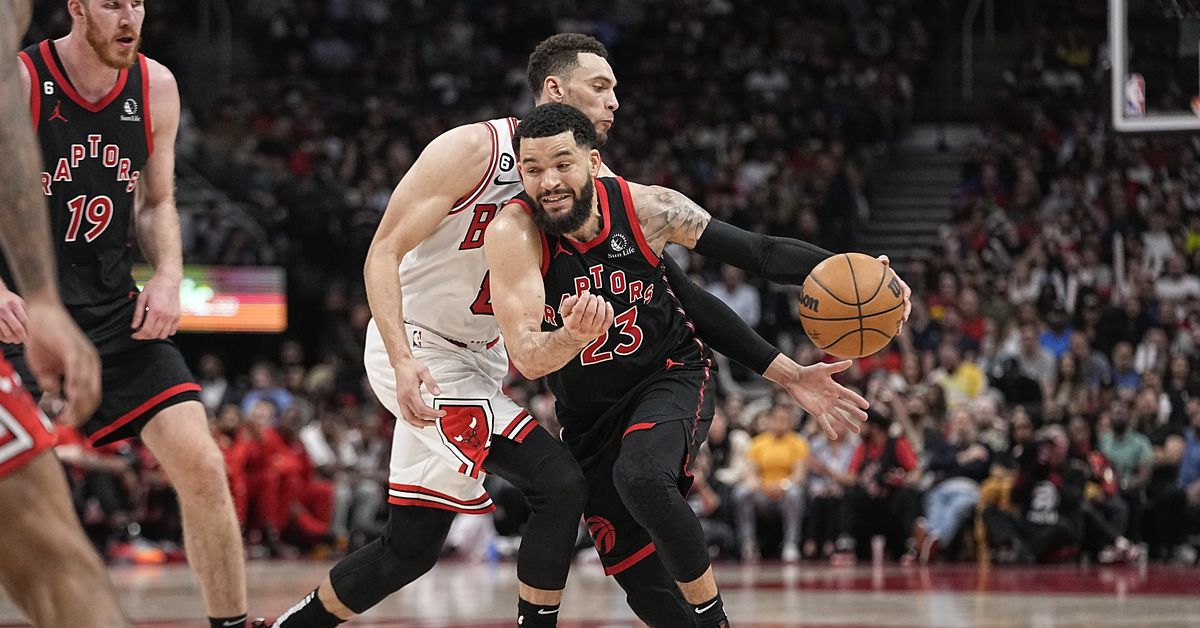Sports
NBA Free Agency 2023: Rockets free agency was a mixed blessing – The Dream Shake

Filed under:
This could have been better, and it could have been worse
Journalists are not supposed to carry water for organizations. We’re supposed to tell the truth.
Here’s the truth. The Houston Rockets’ approach to free agency wasn’t perfect. Arguably, it wasn’t even good.
It wasn’t the abject disaster that some are suggesting, either. In fact, I think Rafael Stone still emerges from the offseason with a strong grade. The Udoka hiring and the draft (if mostly fortuitous rather than a reflection of his abilities) were A+++ moves.
Free agency was more like…a C? The team is, as was the stated goal, “materially better”. On the other hand, assets were mismanaged.
How badly?
The Rockets moved Josh Christopher, Usman Garuba, TyTy Washington and KJ Martin for…nothing.
Nothing. They sent out two second-round picks. They received two second-round picks. Those players were banished into the vast ether known as “the rest of the NBA”.
Martin was the worst offense. He’s looked like the steal of his draft class. Martin is a second-round pick that’s being chosen anywhere from, say, 10th to 18th in a redraft. So flipping him for a pair of second-round picks is clearly suboptimal.
Is it the end of the world? Of course not. Martin Jr. is a talented player, but he’s flawed to the extent that he was never guaranteed a spot in this team’s core. He can’t dribble, has poor defensive awareness and he’s an inconsistent shooter.
For my money, he’s roughly Kelly Oubre Jr. That’s not a player you expect to trade for a first-round pick. You expect to trade Kelly Oubre Jr. for a player that’s as good as Kelly Oubre Jr. Meanwhile, you don’t expect a second-round pick to be… as good as Kelly Oubre Jr.
Bad trade. A fair grade is probably D-. An F would be cash considerations. This was a bad trade.
In fact, all of the trades the Rockets made during free agency were, from a pure asset management, value-for-value perspective, bad trades.
How bad?
Sure, the Rockets “gave away three first-round picks”. Technically. What should we have expected from those first-round picks?
There are two ways to make that evaluation: contextually, and in a vacuum. Let’s start in a vacuum. What is the typical level of production from players selected in the spots that Garuba (23rd), Christopher (24th) and Washington (29th) were selected in?
Last ten 23rd overall picks
2013: Solomon Hill
2014: Rodney Hood
2015: Rondae Hollis-Jefferson
2016: Ante Zizic
2017: OG Anunoby
2018: Aaron Holiday
2019: Darius Bazley
2020: Leandro Bolmaro
2021: Usman Garuba
2022: David Roddy
2023: Kris Murray
Last ten 24th overall picks
2013: Tim Hardaway Jr.
2014: Shabazz Napier
2015: Tyus Jones
2016: Timofe Luwawu-Caborrot
2017: Tyler Lydon
2018: Anfernee Simons
2019: Ty Jerome
2020: R.J. Hampton
2021: Josh Christopher
2022: MarJon Beauchamp
2023: Olivier Maxence-Prosper
Last ten 29th overall picks
2013: Archie Goodwin
2014: Josh Heustis
2015: Chris McCollough
2016: Dejounte Murray
2017: Derrick White
2018: Dzanan Musa
2019: Keldon Johnson
2020: Malachi Flynn
2021: Day’Ron Sharpe
2022: TyTy Washington
2023: Julian Strawther
I’m not going to add up the average VORP or whatever else between those players. Look at them. We know it’s fairly low. What are the takeaways here?
Most notably: my God, the Spurs are good at selecting 29th overall. Murray, White and Johnson at that same position over the course of three years? Forget rigging the draft for Victor Wembanyama. If the league ever gifts the Spurs the 29th pick again, the NBA is in trouble.
In fact, every player selected by a team that didn’t happen to be the San Antonio Spurs at that spot is a fringe NBA talent. More broadly, that’s what we’re seeing at most of these spots: fringe NBA talents.
A lot of these guys are players that you’ll never be able to trade for value. Well over half of them, actually. The odds of landing a player who ends up mattering to your team with a pick in the 20s are low. They’re a lot lower than an average fan thinks.
That’s 30 first-round picks in the 20s. Six of them are proven long-term NBA players, and three of those six were picked by the same organization.
The Rockets didn’t “give away three first-round picks”. They gave away Usman Garuba, Josh Christopher and TyTy Washington. What does that add up to?
There’s a common flaw among folks who tend to think about young basketball players. I’m going to call it Draft Brain. We tend to visualize a ceiling for these guys, and then superimpose it onto their current selves. We see the best, and then, without evidence, we believe in it.
I don’t see it with Josh Christopher. Sorry. I see a guard with bad basketball instincts without the athleticism to make up for them. It’s hard to think of a young volume-scoring guard with less potential (Bones Hyland? Maybe). Prove me wrong, Gup!
I do see it with Garuba. That one hurts. At the same time, I’ve already said that I didn’t see his future being with the Rockets.
If Alperen Sengun is the five of the future, his backup needs to be a great drop coverage rim protector. Garuba needs to be backing a drop coverage rim protector up. He should be a switch hit: just when you’ve got a gameplan for a Brook Lopez, here comes Garuba. Attacking the switch is no longer an option.
Garuba can’t shoulder the burden of interior defense on his own. A Sengun/Garuba big man tandem features zero conventional, primary rim protection.
Plus, let’s be honest – there is a range of outcomes for Garuba. He could be a vital cog on a playoff team. Alternatively, he may be an offensive liability that doesn’t stick in the league.
TyTy Washington? Can’t say. Has hardly played NBA basketball. In college, I thought Washington was a solid point guard who could make most reads in a pick-and-roll with a solid floater.
If I had to guess, he’s Corey Joseph. Washington will probably be an elite third-string point guard and a passable second-string point guard. That’s my hunch.
Of course, he could be more. Any of these guys could be. So getting nothing for them was bad asset management.
With that said, I suspect that this was always part of the plan. The Rockets made eight first-round selections in three drafts. The mathematical odds of them all sticking were always nearly zero.
This was a process of cultivation. First, you harvest, and then you cultivate. You’re separating the wheat from the chaff: which is a concept that I understand, but if you asked me to pick out a chaff from a random collection of 100 different things, we’d be in for a third pot of coffee at least.
The Rockets are now comprised of the four best prospects they’ve drafted to date, two rookies, and veterans. This is how the roster was intended to look for the 2023-24 season.
Here’s another analogy. In a video game, you’ve usually got an inventory limit. That’s a common mechanic. So you’re out in a vast open world. God, I love open-world video games.
Suddenly, you’re over the limit. You can’t run. Unfortunately, you’ve got to drop something.
How did you get over that limit? You found a rare weapon. So you’ve got to drop a common weapon to make room for it.
Would it have been better to sell that weapon? Absolutely. You should have set out with less in your inventory. At the same time – you found a rare weapon. It’s not the end of the world. You’re dropping a Josh Christopher to make room for a Cam Whitmore.
And, of course, a Dillon Brooks.
The Rockets set out with clear goals this summer.
-Bring in an actual point guard? Check.
-Improve the defense? Check.
-Improve the culture? Check.
-Improve the team? Check, check and check.
-Do it as cheaply as possible.
…Do it as cheaply as possible?
The more I sit with it, the more that I think the VanVleet deal was a stroke of genius. Zero complaints there. A two-year overpay with a team option on a third year? Perfection.
The annual amount should be immaterial to everyone but Tilman Fertilla. If you’re not footing the bill, don’t stress it.
A billionaire invites you onto his private yacht. The whole time, you’re fussing. Wait, how much did this thing cost again?
Guess who’s not getting invited back onto the private yacht?
Does this contract hinder the Rockets’ short-term flexibility? You bet. Here’s the thing: the Rockets can’t attract players like VanVleet until they’re competitive. They can’t be competitive until they attract players like VanVleet.
The Rockets were always going to overpay for VanVleet. The length of the deal is crucial. Even if the Rockets pick up that third season, it will only intersect with the rookie extensions of Jalen Green and Alperen Sengun. If they decline it, there’s no crossover at all.
In other words, there was nothing to preserve short-term flexibility for. All the Rockets could do with their money was spend it on the best players they could attract. That’s what they did.
You wouldn’t refuse to take a trip you could afford because you were saving up for a trip. The trip is a trip.
On the other hand, $20 million a season for Dillon Brooks is not great. At the same time – and at the risk of repeating myself to an annoying extent – it’s not the end of the world.
This is a top-five wing defender in the NBA. Sure, the Rockets have a lot of promising young wings, but none of them are sniffing that conversation.
If they do? Having $20 million riding the bench isn’t a death sentence. It’s not ideal, but we see it around the NBA. There are teams that are having success despite paying a player that type of money to not play.
Finally, I’m a huge fan of the Jock Landale signing. If you don’t think this guy is going to be worth more than $8 million a season, I look forward to reexploring that conversation.
To summarize: the Rockets brought in three major rotation upgrades via free agency. They overpaid to do so, but the only contract with any potential to be burdensome belongs to Brooks.
They gave away young players. The Rockets took a value loss by doing so. The probability of it being a meaningful loss is low, but it isn’t zero.
They got better. They got older and more expensive. None of the potential core players were moved. It was not a perfect free agency period:
But truth be told, it wasn’t that bad, either.
GAMBLING PROBLEM? CALL 1-800-GAMBLER (1-800-426-2537) (CO/IL/IN/KS/LA/MD/MI/NJ/OH/PA/TN/VA/WV/WY), (800) 327-5050 or visit gamblinghelplinema.org (MA). Call 877-8-HOPENY/text HOPENY (467369) (NY).
Please Gamble Responsibly. Call 1-800-NEXT STEP (AZ), 1-800-522-4700 (NH), 888-789-7777/visit ccpg.org (CT), 1-800-BETS OFF (IA), or visit OPGR.org (OR) or www.1800gambler.net (WV).
21+ (18+ NH/WY). Physically present in AZ/CO/CT/IL/IN/IA/KS/LA(select parishes)/MA/MD/MI/NH/NJ/NY/OH/OR/PA/TN/VA/WV/WY only. Void in ONT. Eligibility restrictions apply. See terms at draftkings.com/sportsbook. On behalf of Boot Hill Casino & Resort (KS). Licensee partner Golden Nugget Lake Charles (LA).









